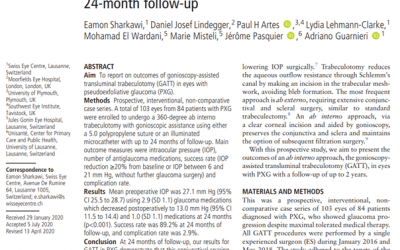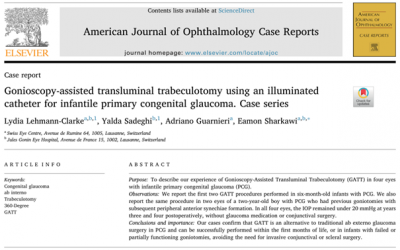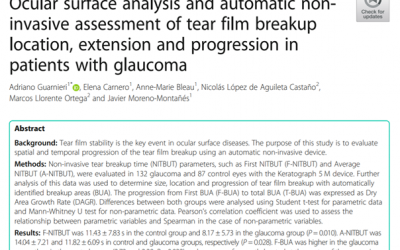Research Unit
The aim of our Research Unit is to develop and refine glaucoma surgery techniques to make them less and less invasive. In this way, we are constantly striving to improve our patients' quality of life by enhancing the ophthalmological care we provide.
Why glaucoma research?
- Glaucoma is a chronic disease, known as the "silent thief" of sight because most patients are asymptomatic, making it the second leading cause of blindness worldwide.
- This condition is still poorly understood at present. The progression of the disease leads to vision loss over time.
- High intraocular pressure (IOP) and fluctuations of fluids inside (aqueous humour) and outside the eye (blood circulation) cause damage to the optic nerve. Nowadays, it is not possible to restore a damaged optic nerve.
- IOP reduction is the only approved method of treating glaucoma, either by medication or surgery. Reducing IOP slows the progression of the disease.
- Drop therapy greatly affects the ocular surface and compliance is the key to effective glaucoma control, which is a major challenge for physicians.
- Adverse effects of topical hypotensive treatment of glaucoma, such as conjunctival hyperaemia, discomfort and itching, are one of the main causes of non-compliance.
- Damage to the ocular surface can also lead to irreversible long-term changes, such as thinning of the conjunctiva, which could worsen the results of various glaucoma surgeries.
- Current treatment guidelines recommend surgery instead, as it can maintain visual function and quality of life for a longer period of time.
Our current research projects
Evolution of glaucoma and ocular surface.
The aim of this research project is to study ocular surface health and the clinical course of glaucoma.
Background: The main goal in the management of glaucoma is to preserve the quality of life of patients by maintaining visual acuity and reducing the side effects of anti-glaucoma therapies. Minimal Invasive Glaucoma Surgeries (MIGS) aims at predictable physiological anti-glaucoma procedures with low complication rates and minimal tissue destruction. We believe that future research should take into consideration the impact on patients' quality of life.
Questions: Are MIGS effective while improving the quality of life of the operated patients? Our centre aims to answer this question while providing the highest quality of care and potentially adapting these new microinvasive techniques for glaucoma surgery as a first line of therapy. Our research may ultimately lead to providing a more appropriate treatment for our patients, with improved tolerability resulting in a better quality of life.
Discover all our front page publications
Results of Gonioscopy-Assisted Transluminal Trabeculotomy (GATT) in patients with pseudoexfoliative glaucoma (GPEX).
Outcomes of gonioscopy-assisted transluminal trabeculotomy in pseudoexfoliative glaucoma: 24-month follow-up. Br J Ophthalmol. 2020 Jul 29:bjophthalmol-2020-315954....
Our experience with gonioscopy-assisted transluminal trabeculotomy (GATT) in young patients with primary infantile congenital glaucoma (PCG).
Gonioscopy-assisted transluminal trabeculotomy using an illuminated catheter for infantile primary congenital glaucoma. Case series. Am J Ophthalmol Case Rep. 2020 May...
Ocular surface analysis and non-invasive assessment of tear film breakage (BUT) in glaucoma patients.
Ocular surface analysis and automatic non-invasive assessment of tear film breakup location, extension and progression in patients with glaucoma. BMC Ophthalmol. 2020...


